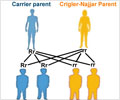
Alpha-L-iduronidase breaks down sugar molecules and is deficient in people with mucopolysaccheridosis I (MPS 1).
This is a so-called lysosomal storage disorder, in which sugary debris builds up in cells, damaging tissue in the heart, eyes, skeleton and brain.
Without replacement enzymes, sufferers of MPS 1 often die in childhood.
Until now, the therapy has been produced by coaxing cultures of cells taken from the ovaries of Chinese hamsters, and is hugely expensive.
The existing drug for MPS 1, laronidase (marketed as Aldurazyme) costs around $300,000 annually for children and $1 million for adults.
Advertisement
The results amount to "proof of concept" for making the enzyme in laboratory conditions, the team say.
Advertisement
Severe MPS I occurs in approximately in one in 100,000 newborns, according to the website Genetics Home Reference, which is supported by the US health authorities.
A milder form, called attenuated MPS I, occurs in about one in 500,000 births.
Source-AFP














